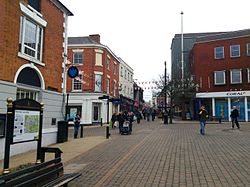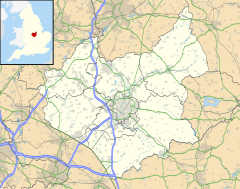Hinckley
| Hinckley | |
|---|---|
 Hinckley town centre |
|
| Hinckley shown within Leicestershire | |
| Population | 45,249 (2011) |
| OS grid reference | SP425939 |
| District | |
| Shire county | |
| Region | |
| Country | England |
| Sovereign state | United Kingdom |
| Post town | HINCKLEY |
| Postcode district | LE10 |
| Dialling code | 01455 |
| Police | Leicestershire |
| Fire | Leicestershire |
| Ambulance | East Midlands |
| EU Parliament | East Midlands |
| UK Parliament | |
Hinckley is a market town in southwest Leicestershire, England. It is administered by Hinckley and Bosworth Borough Council. Hinckley is the second largest town in the administrative county of Leicestershire, after Loughborough.
Hinckley is situated near the larger town of Nuneaton in Warwickshire.
Hinckley has a history going back to Anglo-Saxon times; the name Hinckley is Anglo Saxon: "Hinck" is someone's name and "ley" is a meadow. By the time of the Domesday Book in 1086, Hinckley was quite a large village, and grew over the following 200 years into a small market town—a market was first recorded there in 1311. There is evidence of an Anglo Saxon church – the remnants of an Anglo Saxon sun-dial being visible on the diagonal buttress on the south-east corner of the chancel.
In 2000, archaeologists from Northampton Archaeology discovered evidence of Iron Age and Romano-British settlement on land near Coventry Road and Watling Street. In 2011 this area was officially named and signed as Saxon Paddock.
In the 17th century, the town developed a hosiery industry, producing stockings and similar items. Hinckley played a prominent part in the English Civil War. Its proximity to several rival strongholds—the royalist garrisons at Caldicote, Ashby de la Zouch and Leicester, those of the Parliamentarians at Tamworth and Coventry, and the presence of parties of troops or brigands occupying several fortified houses in nearby Warwickshire—ensured frequent visits by the warring parties. The local townsfolk were forced to decide whether to declare their allegiances openly or attempt to remain neutral—with the risk of having to pay levies, ransoms, and fines to both sides. In March 1644, Hinckley was occupied by a group of Royalist troops, though they were soon driven out by a force of Parliamentarians, who took many prisoners.
...
Wikipedia

